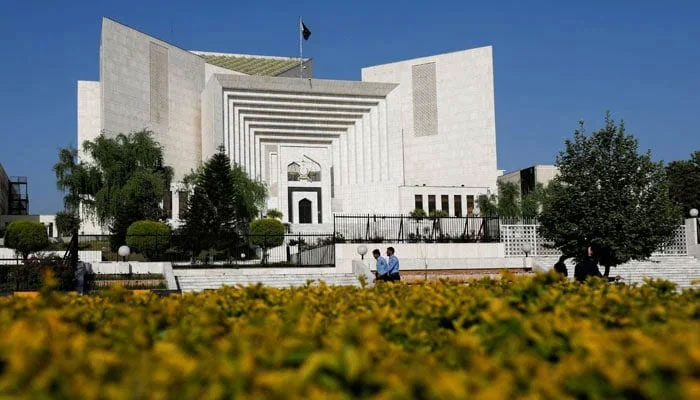Increasing divide
It would be in the judiciary’s own interest to resolve their issues between themselves and stay away from any and all kind of politicization
While temperatures across Pakistan begin to cool down with the arrival of September, the political landscape is adamantly continuing to heat up. The recent turmoil within the judiciary, coupled with the ongoing struggles among political factions, reveals a nation embroiled in chaos. What began as a seemingly simple issue regarding the allocation of reserved seats in the national and provincial assemblies has escalated into a profound divide within the judiciary and intensified conflicts between the executive and judicial branches. The unfolding drama has brought to light the internal fractures within the superior judiciary, particularly with Chief Justice Qazi Faez Isa raising nine pointed questions regarding the Supreme Court’s September 14 ‘clarification order’. This has been followed by Justice Mansoor Ali Shah’s objections to the new amendments to the SC Practice and Procedure Ordinance and the detailed verdict concerning reserved seats. The additional note by Justice Yahya Afridi further underscores this widening chasm.
Predictably, the internal conflict within the judiciary has been seized upon by various political actors, each looking to leverage the situation for their own gain. The ruling elite and the opposition have both found ways to exploit the situation, deepening the crisis further. It would be in the judiciary’s own interest to resolve their issues between themselves and stay away from any and all kind of politicization. Tragically, the rift between the government and the judiciary has escalated to a point where the government has explicitly declared its reluctance to implement the SC’s verdict regarding reserved seats. This refusal raises questions about the government’s commitment to upholding rule of law. Legal and political analysts find it astonishing that the executive would flout a directive from the highest court. Should the government harbour any concerns regarding the verdict, it ought to pursue a full court review. However, if the outcome remains unchanged, it is incumbent upon the government to adhere to the ruling without further excuse.
In this context, PPP Chairman Bilawal Bhutto-Zardari’s insistence on the necessity of forming a constitutional court cannot be ignored. His party has legitimate grievances regarding the historical injustices they have faced at the hands of the country’s judicial establishment and the party’s call for checks and balances reflects a legitimate concern for safeguarding democratic processes. While there is room for debate regarding the need for a constitutional court versus maintaining the Supreme Court’s current powers, it is crucial to also protect the judicial system. In this, parliament establishing reasonable checks and balances on judicial power, provided these do not lead to dictatorial oversight, may not be an entirely unreasonable request. The need for a transparent, open dialogue among all stakeholders – including bar councils, the judiciary, civil society, and parliament – cannot be overstated. Both the judiciary and the government need to reflect and engage in meaningful discussions to resolve their differences before the situation spirals into a constitutional crisis. Can Pakistan afford that? The answer is known to all – including every single stakeholder in the game of Say Uncle.
-
 Laura Dern Reflects On Being Rejected Due To Something She Can't Help
Laura Dern Reflects On Being Rejected Due To Something She Can't Help -
 HBO Axed Naomi Watts's 'Game Of Thrones' Sequel For This Reason
HBO Axed Naomi Watts's 'Game Of Thrones' Sequel For This Reason -
 King Charles' Sandringham Estate Gets 'public Safety Message' After Andrew Move
King Charles' Sandringham Estate Gets 'public Safety Message' After Andrew Move -
 Brooklyn Beckham Plunges Victoria, David Beckham Into Marital Woes: ‘They’re Exhausted As It Seeps Into Marriage
Brooklyn Beckham Plunges Victoria, David Beckham Into Marital Woes: ‘They’re Exhausted As It Seeps Into Marriage -
 Lewis Capaldi Sends Taylor Swift Sweet Message After 'Opalite' Video Role
Lewis Capaldi Sends Taylor Swift Sweet Message After 'Opalite' Video Role -
 Sarah Ferguson Joins Andrew In ‘forcing’ Their Daughters Hand: ‘She Can Lose Everything’
Sarah Ferguson Joins Andrew In ‘forcing’ Their Daughters Hand: ‘She Can Lose Everything’ -
 'Bridgerton' Author Reveals If Actors Will Be Recast In Future Seasons
'Bridgerton' Author Reveals If Actors Will Be Recast In Future Seasons -
 50 Cent Super Bowl Ad Goes Viral
50 Cent Super Bowl Ad Goes Viral -
 'The Housemaid' Lifts Company's Profits: Here's How
'The Housemaid' Lifts Company's Profits: Here's How -
 Michael Douglas Recalls Director's Harsh Words Over 'Wall Street' Performance
Michael Douglas Recalls Director's Harsh Words Over 'Wall Street' Performance -
 Henry Czerny On Steve Martin Created Humor On 'Pink Panther' Set
Henry Czerny On Steve Martin Created Humor On 'Pink Panther' Set -
 Lady Victoria Hervey: Andrew Mountbatten-Windsor's Ex-girlfriend Proud Of Being On Epstein Files
Lady Victoria Hervey: Andrew Mountbatten-Windsor's Ex-girlfriend Proud Of Being On Epstein Files -
 Huawei Could Revive Chip Technology If US Lets Guard Down, Intel CEO Says
Huawei Could Revive Chip Technology If US Lets Guard Down, Intel CEO Says -
 Dolly Parton Created One Of Her Iconic Tracks With Acrylic Nails?
Dolly Parton Created One Of Her Iconic Tracks With Acrylic Nails? -
 Parents Alarmed As Teens Form Emotional Bonds With AI Companion Chatbots
Parents Alarmed As Teens Form Emotional Bonds With AI Companion Chatbots -
 Denzel Washington Surprises LeBron James
Denzel Washington Surprises LeBron James




